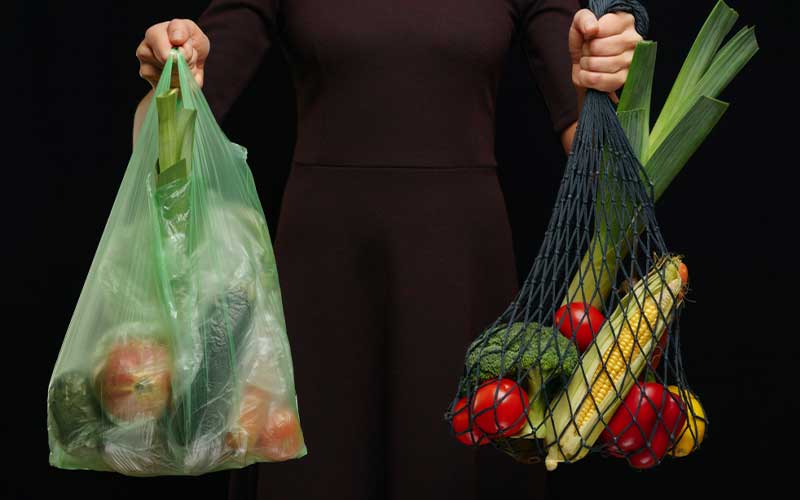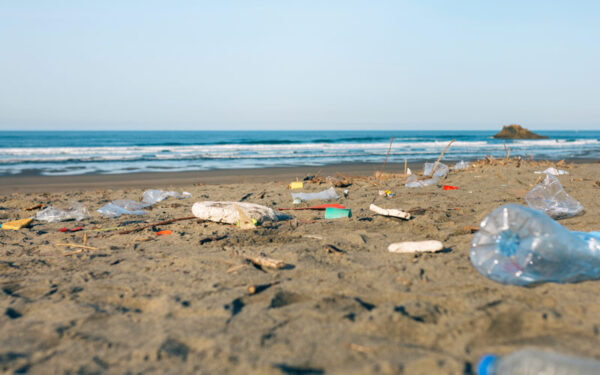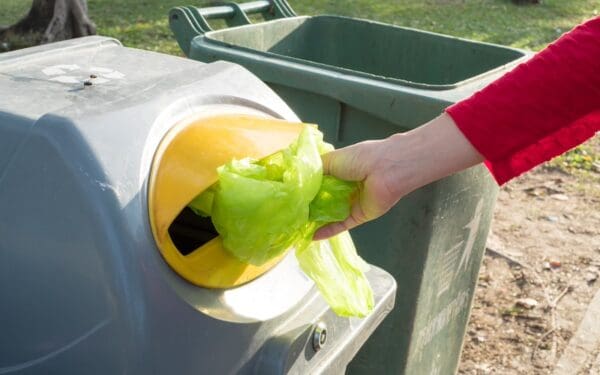
Experts from around the world have stated that no known cases of COVID-19 have been linked to any surface, including reusable bags. Photo: Shutterstock
Single-use plastic has made a temporary comeback. Across New England, public officials and businesses anxious to protect public health amid the COVID-19 pandemic have curbed the use of reusable coffee cups, delayed plastic bag bans, and temporarily prohibited reusable bags from grocery stores. These emergency measures came in rapid succession after grocers associations and members of the public raised concern that reusable bags and containers may transmit the virus.
But the first group to call for the suspension of bag bans wasn’t grocers or the public – it was the plastics industry.
Before most of us fully recognized the implications of the pandemic, the plastics industry began linking COVID-19 infection to reusable bags through the media and lobbying. But this claim is false – and it exposes the industry’s real goal: to take advantage of the crisis to increase profits.
The fact is, the risk from reusable bags and cups is extremely low. Experts from around the world have stated that no known cases of COVID-19 have been linked to any surface, including reusable bags. While leaving them at home right now may ease some stress for the essential workers keeping our grocery stores and other critical services open, ditching reusable bags is not making anyone safer.
But fueling fear during a public health crisis is outrageous and the plastics industry must be called out. More importantly, the pandemic has shown us that we need to implement new solutions for protecting both public health and the environment long-term. And among those solutions are full-scale reuse systems.
An Industry Misinformation Campaign
As early as February 2020, public relations firms and academics funded by the plastics industry began publishing op-eds claiming that reusable bags could carry and transmit COVID-19. For evidence, they pointed to several studies that showed bacteria could exist temporarily on reusable bags. But at least one of those studies, conducted in 2011, was partially funded by the American Chemistry Council – a lobbying group for the plastics industry.
What the industry left out of their op-eds is that these same studies showed that washing reusable bags killed 99.9% of all bacteria.
Just as we’ve all been instructed to properly wash our hands as a preventative measure to contracting the virus, so too could shoppers wash their bags, bag their own groceries, and disinfect shopping carts.
Even without safety measures in place, the risk of infection from reusable bags is very low. Dr. Ben Locwin, a public health expert and consultant with the Centers for Disease Control (CDC) has stated that there are no confirmed cases of contact transmission of COVID-19. His statement is backed by the German Federal Institute for Risk Assessment, and the CDC states on their website that touching surfaces or objects “is not thought to be the main way the virus spreads.”
The Plastics Industry Cares About Its Profits, Not Your Health
The plastic industry has made it no secret that it wants to overturn the growing number of single-use plastic bans. On March 18, the same day that officials in Maine delayed its statewide bag ban, a plastics trade association asked Health and Human Services Acting Secretary Alex Azar to declare all single-use plastic the safest choice for public health. Their request came days after the New England Journal of Medicine found that COVID-19 lasts longer on plastic and stainless-steel than other surfaces.
This simply reinforces that the industry’s true motives have nothing to do with protecting health, and everything to do with maximizing profit. Over the next five years, plastic production is projected to increase by roughly 4%. Bans on single-use plastics threaten that growth and the profits that come with it.
If the plastics industry really cares about public health, it should focus on the many dangers of producing, using, and disposing of its products. From its manufacture to its incineration, plastics generate tremendous air pollution, which causes cancer and reproductive problems, as well as respiratory issues. Such air pollution has been linked to higher mortality rates from COVID-19.
What’s more, chemicals found in many plastics weaken our immune systems. And the climate-damaging emissions associated with plastic worsen the climate crisis, which threatens the health and safety of millions around the globe.
We Don’t Need Single-Use Plastics – We Need Better Systems
Where possible, even now, we can still use reusable bags and containers. In Massachusetts, where the use of reusable bags has been suspended, I have started asking that my groceries not be bagged when checking out. Instead, I place them back in the cart before walking them to my car and bagging them in my reusable bags.
Although this is a temporary work-around, I recognize that it’s not a feasible option for everyone. And while we should reestablish the bring-your-own movement once the public health crisis is over, this pandemic has shown us that simply returning to the way things were “before” is not a permanent fix. We need to be thinking and planning for the future, and that means implementing new systems.
Before COVID-19, several companies were beginning to experiment with systems that show we don’t need to rely on single-use at all. Boston-based Coffee Cup Collective, for example, provides reusable take-out cups at coffee shops for you to use and return to designated drop-off locations. The Collective then picks-up, cleans, and sanitizes the used cups before redistributing them to participating cafes.
This reuse system could easily be transitioned to take-out food containers. In fact, many restaurants in Portland, Oregon, have begun implementing this model using Go Box, a reusable container.
As we begin to rebuild after the pandemic is over, CLF is advocating for a future built on these models – a future that reduces waste, saves money, and truly protects the environment and public health.
But to make reuse systems a reality, we must first stop the plastic industry from using this crisis to roll back the gains we’ve made so far. Join us in standing against these corporate polluters and tell New England’s leaders to stop the rollback of bans on single-use plastic.




